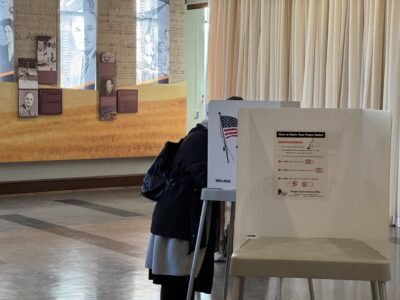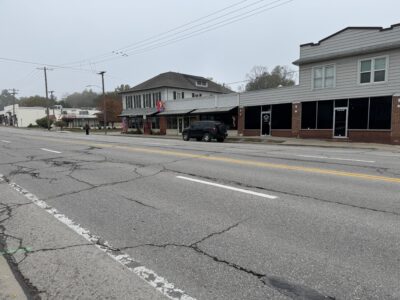
Courtney, Polian won in every corner of Lawrence; other news and notes from Tuesday’s elections

photo by: Chad Lawhorn/Journal-World
A voter marks their ballot at the Carnegie Building in downtown Lawrence on Nov. 4, 2025.
Some news and notes from Tuesday’s local elections in Lawrence and Douglas County:
•••
A big takeaway in the Lawrence City Commission race is that voters were of one mind about two people.
You used to hear of how Lawrence had an east-west divide on local, political matters. There were no signs of that this year. Newcomer candidates Mike Courtney and Kristine Polian were the big winners, finishing No. 1 and No. 2 on Tuesday. A look at voting results broken down by precinct shows they were big winners in every corner of the community.
Every precinct in Lawrence — except one — was won either by Courtney or Polian. In other words, there were no signs of a scenario where the other two candidates — incumbent Bart Littlejohn and former commissioner Bob Schumm — did really well in eastern Lawrence but got overwhelmed by the more populous western Lawrence.
Of the 53 Lawrence precincts, Courtney won 31, Polian won 21 and Schumm won a single precinct. (If you are scoring at home, the one precinct that didn’t go for either Courtney or Polian was Precinct No. 2, which includes parts of Old West Lawrence and includes the area just west of downtown between Sixth and Eighth streets.)
In sum, it was a pretty broad-based geographic victory for the two winners. While the east/west divide has been a real thing in some Lawrence elections, it wasn’t this time.
•••
A narrative from Tuesday night is that the City Commission election was a “change” election, given that the two winners are both new to the commission and the lone incumbent lost his re-election bid. That is fair enough, but it also is worth noting that change on the Lawrence City Commission isn’t that new. Of the last five Lawrence City Commission elections, three of them have resulted in two new members joining the commission. The 2023 election was one of the exceptions, when Mike Dever was the only newcomer to the commission. (The term is relative, since he previously was a commissioner, but had left the commission before coming back in 2023.) The other time was in 2017, when Jennifer Ananda was the lone newcomer.
What is very different this time is that voters were only electing two city commissioners. Historically, voters were choosing three commissioners, with the top-two vote winners getting four-year terms and the third-place finisher getting a two-year term. Such a system ensured that three of the five commissioners were up for election every two years.
That system changed, however, in February of 2023. It was during 2023 that commissioners were putting together a plan to change the structure of the City Commission. They were proposing that the number of commissioners grow to six and that a directly elected mayor also be added. That change in government structure had to go to a citywide election, and commissioners chose to have that election in November 2024, given that it was expected to have large turnout due to the presidential race being on the ballot. The plan, as part of that reorganization, was that all commissioners would have four-year terms, with three of the six commissioners up for re-election every two years.
But here’s the key point: In preparation for that potential change — which still needed to be approved by voters — city commissioners during a Valentine’s Day meeting in February 2023 approved a separate ordinance that changed the future terms of all commissioners to four-year terms. That change was not dependent on whether voters separately approved the broader changes to the structure of the City Commission. That meant when voters went to the polls in November 2023, they were voting for three candidates who each would receive four-year terms.
I’m not sure all voters understood that. Some believed that third-place finisher Amber Sellers had only received a two-year term, and city commissioners after-the-fact took some action to extend her term by two years. That did not happen. It was legally approved before the 2023 elections that all three commissioners would be running for four-year terms, and we reported on election night that Sellers had won a four-year term.
For that matter, we also reported in February 2023 that the city was considering an ordinance that would change all terms to four-years, regardless of whether voters approved the broader City Commission changes. However, I think those proposed, broader City Commission changes overshadowed everything else. When voters rejected those changes during the 2024 elections, I believe some people forgot that the change to four-year terms had already happened.
All that is to say, though, that this year’s election definitely was a change election. It was the first one in recent memory that elected only two city commissioners. That will be the case now every four years. That is a significant change. The old system meant that every two years there was a possibility that the majority of the commission could change, since three seats were always up for election. Now, we will still have elections every two years for the City Commission, but the majority won’t always be at stake. That only will be the case during the period when three seat are on the ballots. In other words, you can only change the majority of the commission every four years. That’s similar to how school board and county commission elections work.
•••
It was a relatively tough night to be an incumbent, elected city official in Douglas County. By my count, there were six city officials throughout the county involved in contested races on Tuesday. Four of the six lost their bids for re-election.
As noted, Littlejohn was the lone incumbent seeking re-election to the Lawrence City Commission, and he finished fourth in the four-person field. Elsewhere, Baldwin City Mayor Casey Simoneau lost his bid, as did Baldwin City Council member Susan Pitts and Eudora City Commissioner Tim Reazin. Baldwin City Council member J. King won his re-election bid, as did Lecompton Mayor Jimmy Wilkins.
•••
Lastly, know that this isn’t the last word on the 2025 elections. None of the vote totals become official until county election officials “canvass” the results on Nov. 17. That process involves determining what provisional ballots should be counted. Provisional ballots include those of voters who may not be properly registered or have moved since they last voted. In general, everyone is allowed to cast a ballot on Election Day, but if there is a question about whether the person is legally qualified to vote, the ballot is sealed in an envelop and declared a provisional ballot. The Board of Canvassers research the particular issue involving that voter, and make a ruling on that voter’s eligibility. Only after that ruling, is the envelope opened. In other words, the board doesn’t know who the person voted for when deciding whether to count the vote.
The canvass process also includes a “post-election audit.” Per state law, the county clerk’s office will physically count the votes in 1% of precincts in the election to ensure that actual vote totals are matching up with the vote totals produced by the counting machines. That audit will take place on Monday, with the results reported at the Nov. 17 canvass.
During the 2023 canvass, just less than 300 provisional ballots were accepted and added to the vote totals. Thus, some races — especially the third place spot on the USD 497 Lawrence school board — are close enough that the new vote totals could impact the outcome. In that race, newcomer Matt Lancaster leads incumbent Bob Byers by 33 votes.
Historically, however, it has been rare that the canvassing process produces a new winner, even in races with closer vote totals. Remember, it is not just how many more votes you pick up during the provisional counting. Your opponent also can pick up votes during the provisional counting, so it really comes down to how much you outperform your opponent. In other words, Byers doesn’t just need to have 33 more votes come his way, but rather needs to have 33 more than what Lancaster gets during the provisionals. If provisional totals are somewhere near the levels seen in 2023, that would mean Byers would need to outperform Lancaster by more than 10 percentage points, which is possible, but not easy in such a closely divided race.






